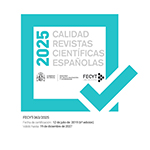The informal organizational structure: the limits of meritocracy in the academic career
Abstract
Introduction. The university is presented as a space characterized by meritocracy and objectivity, both in access and in job promotion. However, women continue to be underrepresented in power and decision-making spaces. The literature points out the existence of multiple factors that impede equal opportunities. Objective. In the present work, it is intended to deepen the influence of the organizational conditions in the professional trajectories of the teaching staff. This article analyses the influence of informal networks on academic careers in two universities, one in Italy and one in Spain. Methodology. To this end, 48 interviews with academics were conducted (24 from each context, with an equal distribution by gender). Results. The results show that informal elements influence the access and promotion processes of both sexes. There is also a tendency towards homosociability, so that the traditional masculinisation of power networks favours the trajectories of men, negatively affecting women’s careers. Conclusions and discussion. The image of the academy as a gender-neutral system continues in the collective imagination. The low awareness of reality is one of the reasons why there are still so few women in the main positions. This study contributes to making visible the practices that hinder or prevent merit from prevailing and that the university approaches the desired academic excellence.
Downloads
Article download
License
In order to support the global exchange of knowledge, the journal Investigaciones Feministas is allowing unrestricted access to its content as from its publication in this electronic edition, and as such it is an open-access journal. The originals published in this journal are the property of the Complutense University of Madrid and any reproduction thereof in full or in part must cite the source. All content is distributed under a Creative Commons Attribution 4.0 use and distribution licence (CC BY 4.0). This circumstance must be expressly stated in these terms where necessary. You can view the summary and the complete legal text of the licence.











